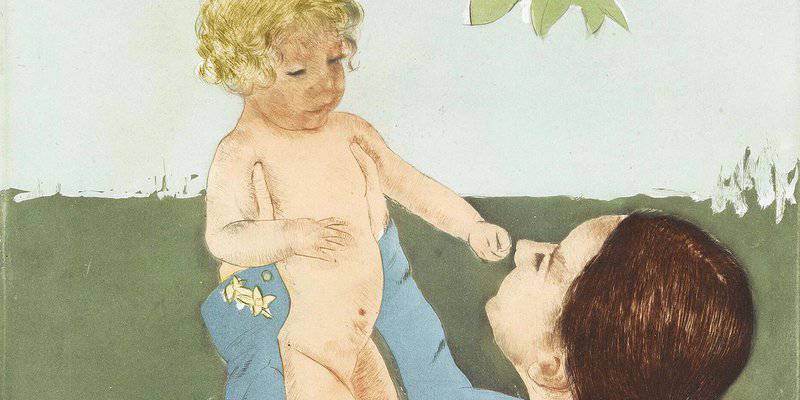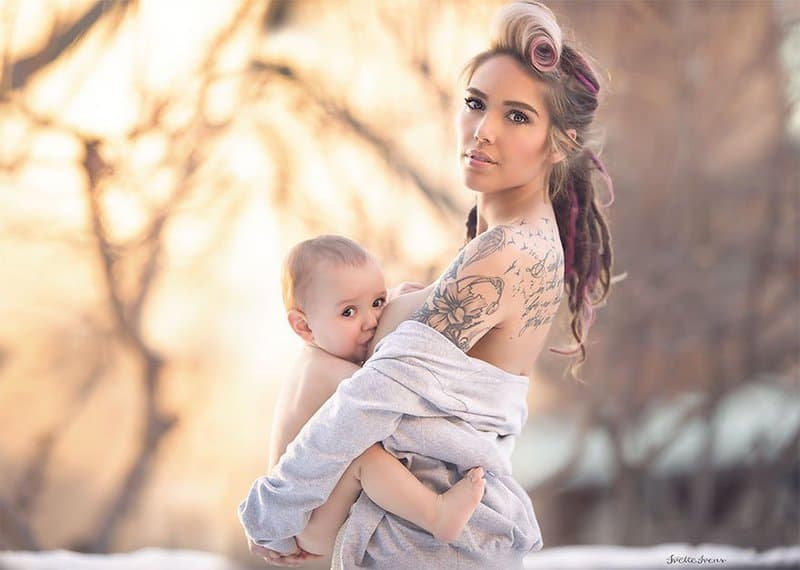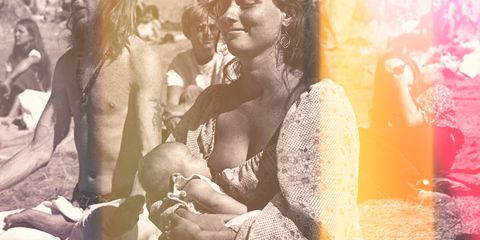
My son was born last October in a hospital in Chinatown, New York, howling and red, the cord around his neck. It was the afternoon, though I only learned this later, for time had been moving strangely ever since I had been admitted to the hospital, as my mind narrowed to focus on one single thought, which was that I wanted this baby to be born alive. I told him that, over and over, as my other plans slipped away. I hadn’t wanted a monitor, I hadn’t wanted an IV, I hadn’t wanted an epidural. Most of all, I didn’t want a C-section.
Time had, in fact, been moving strangely for weeks. The fall had been filled with a succession of endlessly beautiful days that stretched by like a lazy river, slow but inexorable. I passed my due date, then the full moon, at which point I started to wonder if maybe I would always be pregnant, trapped in a body stuffed with a baby who kicked so much that in one ridiculous moment I Googled whether this might be an early sign of epilepsy (it’s not, but also, don’t do this)—yet who seemed unreal. We didn’t even know the sex. He was Schrödinger’s baby, a complete unknown. My maternity leave had already begun, so my husband and I walked all over Brooklyn. We ate spicy food and had sex. But every morning I’d wake up, still pregnant, and sad in a wordless way. The gloom was a weight rather than a thought, and was similar to how I’d felt during my two miscarriages: as if my body was incapable of doing the one thing it was supposed to do most naturally, and that if I couldn’t manage that, what did that mean for whatever came after?
I knew, of course, that birth wasn’t something you can plan. At the same time, what else can you do but plan? I had a midwife practice and a doula. I had a birth plan, printed out, that explained what I wanted: no pain medicine, few interventions, a “natural” birth. I had coconut water; an ugly blue birth ball that rolled around the house for weeks, terrifying the dog; and a copy of Ina May’s Guide to Childbirth, by midwife Ina May Gaskin, in which woman after woman described labor as empowering, even orgasmic.
At two weeks late, though, even my laid-back midwives suggested it was better not to wait. That night, as my husband and I walked to the hospital, we passed a mural of a growling tiger and he snapped a picture of me in front of it, enormous, my mouth stretched into a tight smile. Threaded through Gaskin’s book was the idea that emotional blocks can delay labor, so a few days earlier, I had done something I’d been putting off for weeks and wrote the baby a letter. All I’d been able to express, though, was that I was afraid of hurting the baby, and this feeling was the reason, I realized, I’d been avoiding the letter in the first place. Maybe that was why I couldn’t go into labor, because I felt so inadequate. I didn’t actually believe birth was a vision quest. But maybe it was. What did I know? I’d never done it. Without even having begun, I already felt like I had failed.
They tried various interventions to move labor along, but whenever I had a strong contraction, the baby’s heartbeat would drop precipitously, prompting a medical team to rush in, their faces drawn. That was when I lost track of time, not because there was pain but because of the fear. And 16 hours later, my midwife gently suggested a C-section.
After that, things became jumbled. In the fluorescent lights of the operating room, the nurses shaved my pubic hair while discussing where their kids went to school. I shook so violently that they had to hold down my arms, which had broken free of the restraints. Finally, the doctor yanked and tugged, and then after it didn’t work the first time, did it again, which was horrifying. But a moment later, all of this was eclipsed by the fact that there he was, screaming and alive, my son.
What I didn’t know was endless. I had never changed a diaper. I didn’t know how to soothe a newborn, how often they ate, or how to wrap a swaddle. I didn’t know why one would swaddle. I hadn’t even known if I wanted to have kids until my late twenties, and even then, I wanted them later, when life was more settled, which didn’t happen until I was 36—geriatric, in medical terms.
We got pregnant right away, and I miscarried. “What did you do?” the gynecologist asked me as she couldn’t find the heartbeat. Which is when I decided I wanted a midwife. I got pregnant again and lost that baby, too, which gutted me. By the time I got pregnant a third time, I was 37. I peed on a stick in one of the stalls of my office’s antiseptic bathroom and went downstairs to call my husband, dazed from the news but also because it was Donald Trump’s inauguration day and the world already felt off-kilter. The next day, I went to the Women’s March in DC, the baby a secret, not even a seed, but already I was speaking to him. This is anger, I told him. This is fear. As he grew, his presence became a hum in the background. Once I started to show, people would comment—“It’s a boy?” they’d ask, because of how I was carrying, high and forward—and I’d tell the baby, “You see? Everyone is so excited for you to get here.” Near the end, the lady from my burrito shop leaned down to my belly and shouted, as loud as she could, “Baby! It’s time to come out!” This is anxiety, I’d say sometimes, because I was often anxious. This is hope.
“Motherhood is clearly something every person has to do her own way, but I couldn’t seem to hear about other people’s experiences without holding them up to the light to see how they reflected on mine.”
Because whatever was happening in politics, it was clear that something else that had been taking shape for years was gaining momentum. Stories that had been dormant were bursting into the open, about racism and harassment, and about pregnancy, childbirth, and being a mother. By the time I went back to work in January, the prime minister of New Zealand was pregnant, and so was Illinois senator Tammy Duckworth, who strategized aloud about how she would vote while breastfeeding. Meanwhile, a spate of new books was coming out, almost all of them focused not on the pleasures or importance of parenthood but on upending our expectations, on the way your mind can become unmoored, on the ugly parts, the drudgery. In Nurture, Erica Chidi Cohen, an L.A.-based doula, argues that we should stop using the phrase “natural birth” altogether. “The concept establishes a rigid rubric for achievement, and with that an implicit hierarchy and competitiveness,” she writes. “All birth is natural. It’s as simple as that.”
At first, I sped through these books. It took me just a day to read Meaghan O’Connell’s And Now We Have Everything, in which she describes resenting breastfeeding and feeling terrible for not wanting to have sex with her husband, “but not bad enough to fuck him.” (This section culminates with the two of them fighting at a sex shop where her husband, baby strapped to his chest, has brought her on Valentine’s Day.) There was also Things That Helped, by Jessica Friedmann, which opens with a description of her postpartum depression– induced suicidal ideation that’s almost illicit in its beauty. And Amateur Hour, by Kimberly Harrington, in which she admits to telling her children, after they interrupt an important work call because one of them has gotten hurt, “I think you guys should be bleeding more than that. Like maybe a level of bleeding you can’t control on your own.”
The honesty in these books was so generous, but then, abruptly, I stopped reading. I couldn’t, I found, without having opinions, and I was so tired of opinions. It didn’t make sense. Motherhood is clearly something every person has to do her own way, but I couldn’t seem to hear about other people’s experiences without holding them up to the light to see how they reflected on mine. My favorite ended up being Motherhood, by Sheila Heti, a fiction-ish meditation about the narrator’s ambivalence toward the prospect of becoming a mother, and I liked it partly just because there was nothing parent-related to which I could compare myself.
The honesty in these books was so generous, but then, abruptly, I stopped reading. I couldn’t, I found, without having opinions, and I was so tired of opinions.
This was the terrain I worried about wading into when telling other women about my birth, especially ones who were pregnant. On one hand, I wanted them to know it was possible to have a birth that diverged dramatically from the one they wished for and for that to be okay. On the other, I didn’t want them to think that if that happened and they didn’t feel okay about it, that was a problem. “You don’t seem like the kind of person who’d have a C-section,” someone told me recently. But the gift of having one meant that I understood that the kind of birth you have doesn’t necessarily have anything to do with the kind of person you are, just like the feelings I had about my birth didn’t have to do with my priorities as a mother. They were, like so much of this endeavor, not mine to control.
Soon after returning to work, I watched Diablo Cody’s motherhood-focused movie Tully. Near the beginning, the mother, Charlize Theron, is shown contending with a series of events—diaper change, feeding, breast pump, cries—that repeats, faster and faster, until it evokes a manic delirium. Afterward, the younger coworker I’d seen it with looked at me nervously. “Is it really like that?” she asked, and I couldn’t quite bring myself to tell her, “Yes, it is.” Because I didn’t know how to express that it was, but not only. It was so many different things at once. As O’Connell writes in And Now We Have Everything, “With stuff this big almost any way of looking at it could be true.”
This tiny baby with a tuft of hair sticking straight up on top of his head, fierce and frantic for my breasts when he was hungry, his body rubbery when he was tired, his fists clenched when he wasn’t—I would feel buoyant with love for him one moment and exhausted to the point of disinterest the next. I was disgusted with my own body, mashed up in the wrong ways and places, and I also had never cared less about how I looked. I felt betrayed by my brain, which could hardly compose a complex thought. In certain moments, I imagined myself a dull-minded family cow, only good for milking. At night, as my son wailed, I would walk and pat and rock him, singing lullabies with made-up words, until, a few times, I started crying, too. Once, I became so frustrated, I set him down on the bed next to my husband and explained that I was too angry to touch the baby at all. But this wasn’t the full of it, either. Another night, the baby made a funny noise; I laughed and then looked down to find him smiling back at me, and the joy I felt was so undiluted and raw it was a little like pain, too. Now he is five months old and my inadequacies remain endless, but it has gotten easier. I know about the way he sometimes falls directly to sleep after eating and about how sometimes I’ll look down and find his eyes wide as tiny saucers, a little lemur. I have learned some of his preferences and habits. He cries less and smiles more. I sleep for more than two hours at a stretch. Breastfeeding no longer hurts. I have remembered I have other interests. I have been using my phone too much again. I manage to text my friends back.
Last summer seems unimaginably long ago, but there is one moment I’ve thought of often. Some friends and I had gone to Cape Cod to spend a weekend in a rickety house, and one day we’d packed a picnic, strapped an even more rickety boat to the top of an old van and headed off, motor rattling, to a marshy lake that, on the far side, bordered a thin beach. I was nine months pregnant, and leaving town had already felt risky. Then, when we were in the middle of the lake, crammed in the boat with a yelping dog, one of the oars snapped. We made it the rest of the way, helped along by what had by then become a fierce wind, but once we arrived at the beach, it was freezing—too cold to swim, too cold even to stay. I thought about going into labor on that inaccessible strip of sand and got nervous, but then I forgot about it. I was with people I loved and we were laughing, giddy with the way the day had unfolded, all these events conspiring to make what should have been pleasant exactly the opposite. This, I remember saying to the baby, still then suspended in the galaxy of my belly, is happiness. Standing in the midst of the mess of it all, sand in the sandwiches, goose bumps on our skin, unsure how we’d make it home. It wasn’t that the moment was perfect. It was that it wasn’t, and that was okay. It was enough.
This article originally appeared in the May 2018 issue of ELLE.


